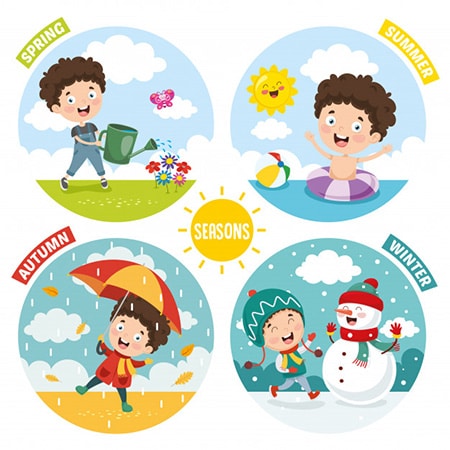Ayurvedic Diet for Spring Season
Ah, the smell of the spring season is sweet as well as refreshing. The warmth of the sunshine on the skin feels so good and soothing. Spring is known as rebirth because at this time all the animals wake up from their hibernation and also have their breeding period. Spring season is the fourth season that comes after the winter season and the days are longer at this time. It is the season when blossom by blossom flowers start to grow and birds start to chirp.

In India Spring is considered the season of fertility and this season is specially celebrated with the name Vasant Panchami. It is one of the promising Hindu festivals celebrated by everyone whether belonging to any caste, religion, or state. It is the season of celebration in India where each state celebrates different festivals like Gudi Padwa is celebrated as New year in Maharashtra Ugadi in Andhra Pradesh, Holi which is the festival of colors celebrated by each state in India, and many more.
Spring brings happiness and joy in everyone's life but do you know it is the season where you have to be careful about your health too. Many people don't know that this season is really harmful to some people. So, we are going to discuss the problems that you can face this beautiful season and some Ayurvedic dietary tips that will help you to enjoy the season without any tension.
Changes In The Body During Spring Season
It is believed by many cultures that the spring season is the season of "ill wind" because there are several changes that happen during this time of the season like you can notice the stuffiness in the nose, rashes on the body, or itching in the throat and many more. You might ask how and what changes bring this beautiful season but yes every season has its pros and cons such as the spring season. Here are many health problems you might face during this time:-
Allergies
The Spring season is one of the times when the allergens roam in the environment freely. The triggering factor during this time is the shedding of pollen through plants and it's one of the biggest reasons for allergies. Insect allergies are very common during this time because you might get bitten by insects that cause pain, itching, redness, and swelling. This is a very normal reaction to allergy but for some people who have serious allergic reactions, it's a life and death situation for them. They can suffer from anaphylaxis (allergic reaction) that requires emergency medical attention and if not treated may cause death. These allergies may involve different body parts like the gut, the lungs, the mouth, the heart, and the skin. So, it's better to be careful at this time.
Asthma and Rhinitis
Spring is the season of pollen which is responsible for causing asthma and also allergic rhinitis. When outdoors it can be triggered by the change in temperature, pollen, insect repellents, and fertilizers while indoors the dust, cleaning chemicals, and molds. Those who suffer from asthma or allergic rhinitis should be more careful.
Allergic Conjunctivitis
We have all commonly seen that children during this time suffer from eye allergy and their eye turns pink. This is one of the common signs that he or she is suffering from Allergic conjunctivitis and this is caused due to an allergic reaction. Kids need to be more careful at this time if they are sensitive to pollen.
Strep Throat
Strep throat is an infection caused by bacteria known as Streptococcal and if you had it before then you need to be more careful. Strep throat can easily spread to another person through touching, coughing, and sneezing. This type of infection is very common during the spring season.
Headaches
The spring season results in the rise of temperature. People who have hot thermals or feel really hot have a habit of switching on the air conditioner which is totally wrong. They need to stop this because the difference in temperature inside out will lead to headaches. So, it is important that your body gets used to the spring season first and then worries about the hot summer weather.
Chest and Nasal Congestion
Due to the fluctuation of temperature, it is very common to feel sweaty and sometimes chilly. These fluctuations are responsible for stopping the body temperature from stabilizing and this may lead to respiratory problems. Some people might face problems like coughing, congestion in the chest, or stuffy nose.
These are the few changes and health issues that you might suffer during this time. It becomes important to take care of your diet and health in order to avoid any health issues. Our dietary habit helps in maintaining good health during this time because food is the key to stay away from seasonal symptoms.
Ayurvedic Diet In Spring Season
According to Ayurveda the cycle of the year is the cycle of life and each season has a dominance of a particular Dosha. So, the Spring season is considered Kapha season where life is slow and heavy. This season is associated with respiratory tract problems resulting in colds, allergies, and congestion. In Ayurveda, these conditions are caused due to accumulation of Ama (Toxins) and the melting of Kapha.
Melting of Kapha
The characteristic features of the Spring season are softness, moisture, increased temperature and nurturing gentleness. The Kapha has qualities like heaviness, slow and wet which is why spring is called the Kapha season. During this season the spring melts as ice and just like that the warmth of this season liquefies the accumulated Kapha in the body.
Releasing of Ama
In the winter season, the Shrotas which is the body channel get tightened and Ama meaning waste materials or toxins start to get accumulated in the cellular channels of our body. As the temperature increases, the warmth relaxes the body and expands the Srotas and it is the chance to release toxic materials.
Kapha and Ama
So, the liquefied Kapha will automatically be released from the body. But due to the fluctuation of weather, the digestive fire or Agni can be good, and sometimes it can be slow. The weak digestion or purification system can lead to the melting of Kapha which can get mixed into circulating Ama creating a cocktail of Kapha and Ama. This mixture of Kapha and Ama is known as Shleshma and the presence of this mixture can make you feel sluggish, foggy, and fatigue.
As the spring season warms the body which increases the amount of circulating Ama and this overwhelms the immune system. The body becomes more prone to infections like flu or cold. A good diet can minimize the accumulation of Ama and eliminate the excessive Kapha.
Here Are Some Ayurvedic Dietary Habits
If you see from an Ayurvedic point of view the spring season is the time when you should eat lean. Now is the time to replace heavy, sour, oily, and sweet foods with something light, dry, bitter, astringent, and pungent.

Early-Morning
Warm water mixed with one spoon of honey and half a squeezed lemon.
Breakfast
You can include Semolina, rice flakes, oats along with green vegetables like broccoli, cabbage, cauliflower, endives, and spring greens.
Mid-Morning
Include fruits like cherries, kiwis, apricots, or drink coconut water.
Lunch
Chapati with lentils and salads
Evening
Green tea along with Poha
Pre-Dinner
Green soup
Dinner
Boiled rice with lentils of any type along with salads
Some Important Instructions
- Reduce food that is salty, sour, and sweet in taste.
- Avoid foods like bananas, figs, dates, pineapple, dates, oranges, melons, and coconuts.
- Reduce the intake of heavy watery vegetables like olives, avocados, sweet potato, cucumber, and squash.
- Increase light foods asparagus, beets, carrots, cherries, fennels, kiwis, kale, lettuce in the diet.
- Include vegetables that are bitter in taste in order to reduce excessive Kapha from the body.
- Warm water with honey and lemon in the morning will help in purifying the body.
- Avoid ant snacking between the meals.
- Reduce the use of oil and ghee while cooking.
- Include spices like ginger, mustard, black pepper, asafoetida in the diet as they are pungent.
- Avoid adding spices like cardamom, cinnamon, ginger, or turmeric in the milk. Because this will only reduce the quality of milk.
- Reduce the intake of meats like beef, duck, pork as they are heavy and difficult to digest.
- Take less bread and nuts.
Recipe To Make Clean Green Soup
Ingredients:-
- One cup of Water
- Three cups of Broccoli
- Three cups of spinach
- One cup of celery
- Half a teaspoon black pepper.
- One teaspoon turmeric
- Salt to taste
- Half a slice of lemon
Directions:-
- Heat the saucepan on medium-high heat and add water along with all the vegetables, turmeric, black pepper and bring it to a boil. Turn down the head to slow and cook it for 10 more minutes until everything is soft.
- Turn off the heat and add all the mixture into a blender and blend them until it’s smooth.
- Add salt and lemon into the paste and you are ready to drink hot as well as healthy soup.
Conclusion
It is concluded that the Spring season is "kings of all the seasons" but it is also important to take care of health. As discussed this season is well known to cause health problems and Vata is more prominent. The above-mentioned Ayurvedic diet will help in reducing toxins from the body and stopping the collection of Ama.

